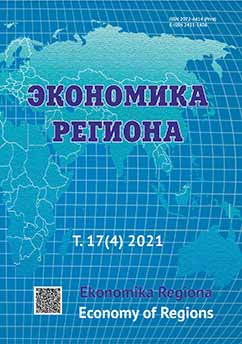Интегральный индекс оценки развития B2C электронной коммерции в странах ЕАЭС
Composite Index for Evaluating the B2C E-Commerce Development in the EAEU Countries
Author(s): Irina Dmitrievna Turgel, Aksaule B. Zhanbozova, Tolkyn AzatbekSubject(s): Economy, Geography, Regional studies
Published by: Институт экономики Уральского отделения Российской академии наук
Keywords: B2C e-commerce; retail e-sales; composite indices; Eurasian Economic Union; digital skills; internet; internet affordability; cashless payments; online transactions, delivery infrastructure
Summary/Abstract: A comparative assessment of business-to-company (B2C) e-commerce development in the Eurasian Economic Union (EAEU) countries is difficult to conduct due to the incommensurability of their economies and the lack of homogeneous data. To solve this problem, a composite index combining various sub-indices and indicators was created. The presented article discusses the creation of tools for assessing the B2C e-commerce development in the EAEU countries. The initial research data was gathered from reports of the International Telecommunication Union, UNESCO, the Universal Postal Union, the World Bank, as well as from official data of national statistical agencies and central (national) banks of the EAEU countries. The composite index was constructed by normalising the values of the indicators (method of normative ideals) for their comparison. Further, data values underwent a linear transformation to a 0 — 100 scale in order to ensure their proportionality. Weighting coefficients of the indicators were determined by the method of expert evaluations. Based on the developed index, countries may be ranked by the overall index, as well as by structural factors of B2C e-commerce readiness and use intensity. The use of the e-commerce development potential was analysed based on the values of individual sub-indices. In addition, the proposed toolkit can be applied to monitor changes in the EAEU indices over time, provided that the normalised values of the indicators are maintained. Policy makers can use the research results for improving the conditions for the e-commerce development in the EAEU member-states, as well as for creating a common space of e-commerce that contributes to the strengthening of economic integration. Moreover, the article contains methodological recommendations that can be utilised to create similar assessment tools for other regional economic blocs. The limitations of the study are related to the need to consider the regional specificity of the analysed countries or regions.
Journal: Экономика региона
- Issue Year: 17/2021
- Issue No: 4
- Page Range: 1332-1345
- Page Count: 14
- Language: Russian

